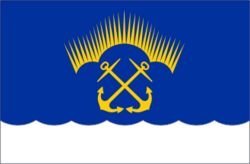 | |
| Proportion | 2:3 |
|---|---|
| Adopted | 1 July 2004 |
| Design | 2 unequal strips of blue on top and red on bottom, with an aurora in the middle of blue strip |
| Designed by | P. Abarin [1] |
The flag of Murmansk Oblast in Russia consists of two horizontal bands of blue and red, the blue being four times wider than the red. Within the blue is a stylized yellow aurora, which takes up two fifths of the width of the flag. [1] The aurora represents the fact that the Murmansk Oblast is north of the Arctic Circle. The blue represents beauty and greatness, and the red represents courage and strength. [2] The flag is the winner of a design contest [1] which was officially adopted on 1 July 2004. [3]



















